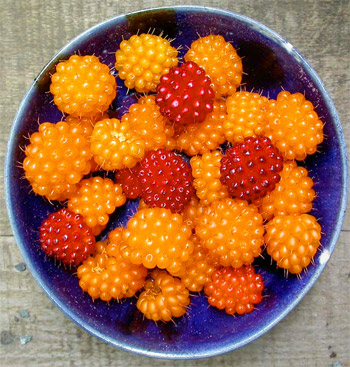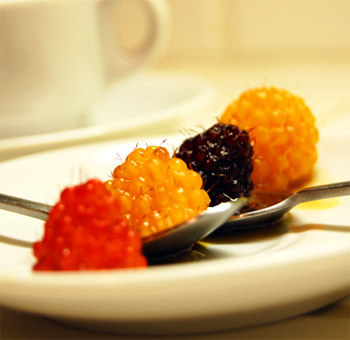|
|
|
 , ,
Font size |
Encyclopedia of Health Benefits of Berries

25. Salmonberries:
The ripe fruit has a sweet taste and is yellow to orange-red in color.
They are made into jams, candies, jellies, and wines. The Native Americans eat
these along with half-dried
salmon roe, hence the name. Salmonberries are also called thimbleberries.
Salmonberries are edible and share the fruit structure of the raspberry. They
are native to the North American West Coast from west central Alaska to
California. They were an important food for indigenous peoples. Traditionally,
the berries were eaten with salmon or mixed with oolichan grease or salmon roe.
Today, salmonberries are often used in wines, jams, and candy.
Salmonberries also known as Alaskan Berries are essentially a flowering shrub
belonging to the rose family. They are not only grown for the delicious fruit
they reap but also for the beautiful vibrant flowers they grow. This Raspberry
look alike has a number of drupelets tightly bundled together, reflecting a
similar appearance to that of a cluster of pearls! The color of this fruit
ranges from a beautiful golden tainted yellow to a vibrant glossy orange red.
Salmonberries have a pleasant palatable taste, not too sweet and not too sour,
just perfect, and a delectable aroma!
These luscious, vibrant, glossy berries are at their best throughout late summer
and early autumn. Salmonberries are natives to the North Americans and
traditionally they were eaten with salmon, hence, the derivation of the name!
Salmonberries are also commonly known as Alaska berries, most likely because
they are found in abundance in the �Raspberry Island� in Alaska.
This luscious, tantalizing fruit is practically fat free and houses a number of
nutrients and health benefits. It�s not only appealing in appearance, but
appealing to the health too!
Salmonberry Nutritional Information
Salmonberries consist of a substantial amount of vitamin C and vitamin A. A 100g
serving of salmonberries can provide for 15% of the daily required amount of
vitamin C and 10% of that of vitamin A. Additionally, salmonberries are a good
source of minerals such as calcium, potassium and iron which are all necessary
for optimal health. These sweet tasting berries are also a good source of
dietary fiber, are low in sodium, zero fat and cholesterol free.
Salmonberry Health Benefits
Many health benefits can be derived from the Salmonberries:
-
These berries are completely cholesterol free.
-
They do not contain any saturated fats.
-
Their high manganese contents make them beneficial for humans.
-
The fruits are also a rich source of the vitamins C and K.
-
The leaves and roots of these shrubs have astringent properties.
-
Their root bark is astringent, analgesic, stomachic and disinfectant.
The berries are considered to have an insipid taste by some people. But
depending on the place they grow in, properly ripe berries have a delicious
taste and are used for various purposes.
Edible Uses of Salmonberries
-
The sweet berries can be eaten raw.
-
They are often used for flavoring candies.
-
Jams and jellies are made from the Salmonberry following simple recipes.
-
They are also used for making wine and other alcoholic beverages.
-
Young shoots of these plants are eaten both raw and cooked like
asparagus.
-
The sprouts can be cooked with salmon or many other fishes.
-
Their leaves are sometimes used as substitute for tea.
 Medicinal Uses of Salmonberries Medicinal Uses of Salmonberries
-
A poultice made from their leaves is used for dressing burns.
-
Decoction of the roots is used for treating various stomach complaints.
-
The decoction is also useful for lessening labor pain.
-
The bark of these plants is powdered to be used for treating burns and
soars.
-
Poultice made from the bark is applied to ease tooth ache and to cure
open wounds.
Other Uses of Salmonberries
-
The fruits are sometimes used for obtaining a bluish or purple dye.
-
The plants of this species are often grown as ornamental plants.
-
Using Salmonberry during Pregnancy
It is advisable to avoid consuming these fruits in any form during pregnancy
as it may cause some complications.
Next..
Dated 12 March 2013

|
|
|
|
|
|
|









